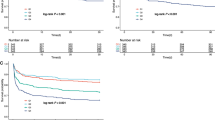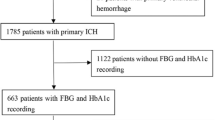Abstract
No study investigated the possible detrimental effect of stress hyperglycemia on patients affected acute ischemic stroke (AIS) undergoing intravenous thrombolysis (IVT). A new index, the glucose-to-glycated hemoglobin ratio (GAR), has been developed for assessing stress hyperglycemia. We retrospectively analyzed data from a prospectively collected database of consecutive patients admitted to the Udine University Hospital with AIS that were treated with IVT from January 2015 to December 2019. Four hundred and fourteen consecutive patients with AIS undergoing IVT entered the study. The patients were then stratified into four groups by quartiles of GAR (Q1–Q4). The higher GAR index was, the more severe stress hyperglycemia was considered. Prevalence of 3 months poor outcome (37.7% for Q1, 34% for Q2, 46.9% for Q3, and 66.7% for Q4, p for trend = 0.001), 3 months mortality (10.5% for Q1, 7.5% for Q2, 11.2% for Q3, and 27.1% for Q4, p for trend = 0.001), and symptomatic intracranial hemorrhage (0.9% for Q1, 0.9% for Q2, 5.1% for Q3, and 17.7% for Q4, p for trend = 0.001) was significant different among the four groups. AIS patients with severe stress hyperglycemia had a significantly increased risk of 3 months poor outcome (OR 2.43, 95% CI 1.14–5.22, p = 0.02), 3 months mortality (OR 2.38, 95% CI 1.01–5.60, p = 0.04), and symptomatic intracranial hemorrhage (OR 16.76, 95% CI 2.09–134.58, p = 0.008) after IVT. In conclusion, we demonstrated that stress hyperglycemia, as measured by the GAR index, is associated to worse outcome in AIS patients undergoing IVT.




Similar content being viewed by others
Data availability
The datasets used and analyzed during the current study are available from the corresponding author on reasonable request.
References
Bruno A, Biller J, Adams HPJ et al (1999) Acute blood glucose level and outcome from ischemic stroke. Trial of ORG 10172 in acute stroke treatment (TOAST) investigators. Neurology 52:280–284
Desilles JP, Meseguer E, Labreuche J et al (2013) Diabetes mellitus, admission glucose, and outcomes after stroke thrombolysis: a registry and systematic review. Stroke 44:1915–1923
Chen R, Ovbiagele B, Feng W (2016) Diabetes and stroke: epidemiology, pathophysiology, pharmaceuticals and outcomes. Am J Med Sci 351:380–386
Melamed E (1976) Reactive hyperglycaemia in patients with acute stroke. J Neurol Sci 29:267–275
Mankovsky BN, Metzger BE, Molitch ME, Biller J (1996) Cerebrovascular disorders in patients with diabetes mellitus. J Diabetes Complicat 10:228–242
Su YW, Hsu CY, Guo YW, Chen HS (2017) Usefulness of the plasma glucose concentration-to-HbA1c ratio in predicting clinical outcomes during acute illness with extreme hyperglycaemia. Diabetes Metab 43:40–47
Zhu B, Pan Y, Jing J et al (2019) Stress hyperglycemia and outcome of non-diabetic patients after acute ischemic stroke. Front Neurol 10:1003
Jauch EC, Saver JL, Adams HP Jr, Council on Cardiovascular Nursing Council on Peripheral Vascular Disease Council on Clinical Cardiology et al (2013) Guidelines for the early management of patients with acute ischemic stroke: a guideline for healthcare professionals from the American Heart Association/American Stroke Association. Stroke 44:870–947
Powers WJ, Rabinstein AA, Ackerson T et al (2019) Guidelines for the early management of patients with acute ischemic stroke: 2019 update to the 2018 guidelines for the early management of acute ischemic stroke: a guideline for healthcare professionals from the American Heart Association/American Stroke Association. Stroke 50:e344–e418
Ma H, Campbell BCV, Parsons MW, EXTEND Investigators et al (2019) Thrombolysis guided by perfusion imaging up to 9 hours after onset of stroke. N Engl J Med 380:1795–1803
Adams HP Jr, Bendixen BH, Kappelle LJ et al (1993) Classification of subtype of acute ischemic stroke. Definitions for use in a multicenter clinical trial TOAST Trial of Org 10172 in acute stroke treatment. Stroke 24:35–41
Hacke W, Kaste M, Fieschi C et al (1995) Intravenous thrombolysis with recombinant tissue plasminogen activator for acute hemispheric stroke. The European Cooperative Acute Stroke Study (ECASS). JAMA 274:1017–1025
Hacke W, Kaste M, Bluhmki E et al (2008) Thrombolysis with alteplase 3 to 4.5 hours after acute ischemic stroke. N Engl J Med 359:1317–1329
Demchuk AM, Morgenstern LB, Krieger DW et al (1999) Serum glucose level and diabetes predict tissue plasminogen activator-related intracerebral hemorrhage in acute ischemic stroke. Stroke 30:34–39
Bernard C (1878) Lecons sur les Phenomenes de la Vie Communs aux Animaux et aux Vegetaux. JB Bailliere et fi ls, Paris
Marik PE, Bellomo R (2013) Stress hyperglycemia: an essential survival response! Crit Care 17:305
Herman JP, McKlveen JM, Ghosal S et al (2016) Regulation of the hypothalamic-pituitary-adrenocortical stress response. Compr Physiol 6:603–621
Marik PE, Levitov A (2010) The “koala stress syndrome” and adrenal responsiveness in the critically ill. Intensive Care Med 36:1805–1806
Badawi O, Waite MD, Fuhrman SA, Zuckerman IH (2012) Association between intensive care unit-acquired dysglycemia and in-hospital mortality. Crit Care Med 40:3180–3188
Bruno A, Levine SR, Frankel MR et al (2002) Admission glucose level and clinical outcomes in the NINDS rt-PA stroke trial. Neurology 59:669–674
Capes SE, Hunt D, Malmberg K, Gerstein HC (2000) Stress hyperglycaemia and increased risk of death after myocardial infarction in patients with and without diabetes: a systematic overview. Lancet 355:773–778
Dungan K, Braithwaite SS, Preiser JC (2009) Stress hyperglycemia. Lancet 373:1798–1807
Capes SE, Hunt D, Malmberg K, Pathak P, Gerstein HC (2001) Stress hyperglycemia and prognosis of stroke in nondiabetic and diabetic patients: a systematic overview. Stroke 32:2426–2432
MacIntyre EJ, Majumdar SR, Gamble JM, Minhas-Sandhu JK, Marrie TJ, Eurich DT (2012) Stress hyperglycemia and newly diagnosed diabetes in 2124 patients hospitalized with pneumonia. Am J Med 125:1036.e17–23
Levine SR, Welch KM, Helpern JA et al (1988) Prolonged deterioration of ischemic brain energy metabolism and acidosis associated with hyperglycemia: human cerebral infarction studied by serial 31P NMR spectroscopy. Ann Neurol 23:416–418
Siesjö BK, Bendek G, Koide T, Westerberg E, Wieloch T (1985) Influence of acidosis on lipid peroxidation in brain tissues in vitro. J Cereb Blood Flow Metab 5:253–258
Steinberg HO, Tarshoby M, Monestel R et al (1997) Elevated circulating free fatty acid levels impair endothelium-dependent vasodilation. J Clin Invest 100:1230–1239
Oliver MF, Opie LH (1994) Effects of glucose and fatty acids on myocardial ischaemia and arrhythmias. Lancet 343:155–158
Putaala J, Sairanen T, Meretoja A et al (2011) Post-thrombolytic hyperglycemia and 3-month outcome in acute ischemic stroke. Cerebrovasc Dis 31:83–92
Quast MJ, Wei J, Huang NC et al (1997) Perfusion deficit parallels exacerbation of cerebral ischemia/reperfusion injury in hyperglycemic rats. J Cereb Blood Flow Metab 17:553–559
Kamada H, Yu F, Nito C, Chan PH (2007) Influence of hyperglycemia on oxidative stress and matrix metalloproteinase-9 activation after focal cerebral ischemia/reperfusion in rats: relation to blood-brain barrier dysfunction. Stroke 38:1044–1049
Dietrich WD, Alonso O, Busto R (1993) Moderate hyperglycemia worsens acute blood-brain barrier injury after forebrain ischemia in rats. Stroke 24:111–116
Palaiodimou L, Lioutas VA, Lambadiari V, Paraskevas GP, Voumvourakis K, Tsivgoulis G (2019) Glycemia management in acute ischemic stroke: current concepts and novel therapeutic targets. Postgrad Med 131:423–437
Johnston KC, Bruno A, Pauls Q et al (2019) Intensive vs standard treatment of hyperglycemia and functional outcome in patients with acute ischemic stroke: the SHINE randomized clinical trial. JAMA 322:326–335
Funding
This research received no specific grant from any funding agency in the public, commercial, or not-for-profit sectors.
Author information
Authors and Affiliations
Contributions
Conceptualization, GM and CS; methodology, GM and CS; software, CS and SL; validation, SL, GLG and MV; formal analysis, GM; investigation, CS, SL, SP, AS, and AM; resources, CS, SL, SP, AS and AM; data curation, GM; writing—original draft preparation, GM; writing—review and editing, GM; visualization, GLG; supervision, MV.
Corresponding author
Ethics declarations
Conflict of interest
The authors declare that they have no competing interests.
Additional information
Publisher's Note
Springer Nature remains neutral with regard to jurisdictional claims in published maps and institutional affiliations.
Rights and permissions
About this article
Cite this article
Merlino, G., Smeralda, C., Gigli, G.L. et al. Stress hyperglycemia is predictive of worse outcome in patients with acute ischemic stroke undergoing intravenous thrombolysis. J Thromb Thrombolysis 51, 789–797 (2021). https://doi.org/10.1007/s11239-020-02252-y
Published:
Issue Date:
DOI: https://doi.org/10.1007/s11239-020-02252-y




